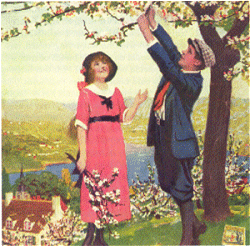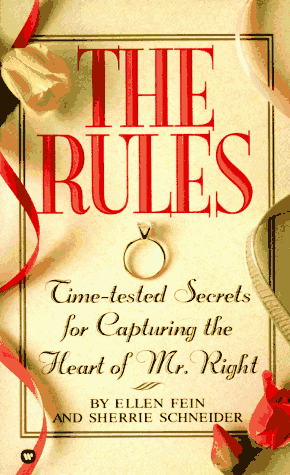

COURTSHIP
In the excellent magazine The American Enterprise, (www.theamericanenterprise.org) Leon and Mary Elizabeth Podles had some articles that have so much wisdom in them. The first is by Mrs. Podles about courtship. In God's ideal world this is how men and women will find their mate. Rev. Moon matched strangers by the tens of thousands in the 20th century, but we feel the UC will turn to the old-fashioned tradition of courtship and give up the insane feminist idea of dating. So much of what is true is what our Founding Fathers did. Salvation is restoration. Restoration is many times going to be the restoration of Victorian values, especially the value of patriarchy in the traditional family. Leon Podles will mention patriarchy in his article about manhood.


Courtship and the Rules (Or, Why Young Women Need Flowers & Candy)
By Mary Elizabeth Podles
There is a tradition in my house of not reading bestsellers, but
I’ve made  an
exception for The Rules: Time-tested Secrets for Capturing the Heart of Mr. Right.
Politically incorrect from the title on, this guide to old-fashioned coquetry has raised
the hackles of every feminist writer worth her salt. The book’s crime: implicitly
casting doubt on the sexual revolution, which was supposed to bring the sexes into
equilibrium. Making childbirth optional through contraception — and providing
abortion on demand for those pesky infants who still insisted upon appearing on the scene
— was supposed to abolish the old stereotype of man as hunter and woman as prey. Then
with the field of sexual pleasure-without-consequence open to everyone equally, the rules
become the same for women as for men. All we have to do is speak our preferences plainly
and a whole new world of mutual felicity should arise. an
exception for The Rules: Time-tested Secrets for Capturing the Heart of Mr. Right.
Politically incorrect from the title on, this guide to old-fashioned coquetry has raised
the hackles of every feminist writer worth her salt. The book’s crime: implicitly
casting doubt on the sexual revolution, which was supposed to bring the sexes into
equilibrium. Making childbirth optional through contraception — and providing
abortion on demand for those pesky infants who still insisted upon appearing on the scene
— was supposed to abolish the old stereotype of man as hunter and woman as prey. Then
with the field of sexual pleasure-without-consequence open to everyone equally, the rules
become the same for women as for men. All we have to do is speak our preferences plainly
and a whole new world of mutual felicity should arise.Unfortunately, with the playing field leveled, we find ourselves playing a form of no-holds-barred rugby, when some of us would rather be playing croquet. Now, many women play rugby and enjoy it — but all who play it end up shaken and bruised. Somehow not everyone is happy in the new feminist framework. Marriage, which should have become a 50-50 partnership with every child a wanted child, is not alive and well in America. Dare we say it? The new concept of sexual parity does not work. Enter the Rules Girls, authors Ellen Fein and Sherrie Schneider. Right out loud they announce that something is awry. Things are not better than what we had before. It may be that men and women are constitutionally different. Recent neurological studies reveal that men and women use entirely different areas of their brains to solve problems, endure pain, and store the gender of the definite article in German. The relatively new science of evolutionary psychology dares to suggest that the different neurologies have distinct advantages, and anyway are too deeply ingrained by eons of human experience to be altered by the relatively new processes of human reason.
Or consider the bowerbird of New Guinea. The male spends hours constructing an elaborate edifice of no apparent practical purpose. Some build "dancing platforms," thick mats of leaves arranged silvery side up and studded with flowers and fruits; some create "maypoles," towers of berry-studded twigs twined around saplings with garlands of fruits and flowers swung between them. Some plant surrounding lawns of tree moss. Some build long "avenues" of decorated interlacing sticks between trees. Others build huts the size of children’s playhouses and paint the insides with a mixture of fruit juices, charcoal, and saliva, daubed on with a "paintbrush" made of leaves (a rare instance of an animal using a tool). These puzzling structures are not nests; the female builds a small brown nest elsewhere. The bowers are far too conspicuous for the assured safety of young. Instead, they seem solely meant to please the female bowerbird, to persuade her that the builder is a suitable mate. No one asks these charming and energetic birds whether all this is really necessary, and from an evolutionary standpoint, the strategy seems eminently successful: there are 17 species of bowerbird, each with its own distinct architectural style. So, too, men and women seem to be different, at least when it comes to courtship behavior. Our grandmothers may have known what they were doing after all. And so, having empirically discovered the bowerbird lurking in every male heart, the Rules Girls decided to reinvent the art of playing hard to get: Men love a challenge — that’s why they play sports, fight wars, and raid corporations. The worst thing you can do is make it easy for them…. Men really feel good when they work hard to see you. Don’t take that away from them. So far so good. The Rules Girls, the evolutionary psychologists, and I are in accord in opposing conventional feminist assumptions. But alas, the enemy of my enemies is not always my friend. I have serious reservations about The Rules. Partly I dislike its smartypants tone. Mostly, though, I object to the fact that the authors show you how to behave as if you were reticent, modest, and chaste — without insisting you actually adopt those virtues.
Miss Austen also raises the question many intelligent women find themselves asking: Is all this coyness really necessary? It smacks of insincerity and manipulation even in the best of circumstances. Surely we reasonable creatures could dispense with these convolutions? Even the redoubtable Miss Manners — a clear descendant of Austen — has to wrestle with this one a little when prescribing a dose of Rules behavior to a young woman whose suitor’s ardor seems to be cooling: Miss Manners apologizes if this [recommendation] sounds like the old keep-’em-guessing routine. She is well aware how exhausting, degrading, and debilitating such antics are for the sure and loving heart. That is why God invented marriage: to give people a rest.
Miss Manners has put her dainty finger on the heart of the truth, a truth which even the Rules Girls, for all their smartness, have not quite reached. The difficult path of courtship is not just a biological quirk; it is a serious promise spoken without words. Love always asks for deeds, not words. In serious courtship, a man conveys to a woman that if she is worth all this trouble to court, she must be worth more than any other mate in the world, and shall henceforth be The One Woman. On her part, the woman promises that if she was this hard for him to get, surely she will, as his wife, be impossible for others to get. The courtship dance is the unspoken pledge of future fidelity — the best of all bases for a happy marriage. The uncertainties of the romantic beginning whisper a promise of stable partnership. The best section of The Rules deals with what to do with a man once you get him. Their rules here are good ones to follow even if you are planning to be a nun, for they are the rules of the universe: "Don’t lie," "try to be serene and unselfish, or you won’t be a happy princess," "try not to raise your voice or scream too much," and so on. These are the rules for all who would lead a happy life. That, submit Ms. Fein and Ms. Schneider, is why they wrote the book in the first place. And that, dear readers, is also why I have written this article on the importance of the tradition of courtship — not for you, but for my daughters, Mary and Sarah. Whether I hand on to you motherly advice, tough house rules, or just my dog-eared copy of Sense and Sensibility, it is simply because I want for you nothing more nor less than a happy life. Mary Elizabeth Podles, former curator of Renaissance Art at the Walters Gallery, has degrees from Wellesley and Columbia and currently lives with her Mr. Right and their six children in Baltimore. |